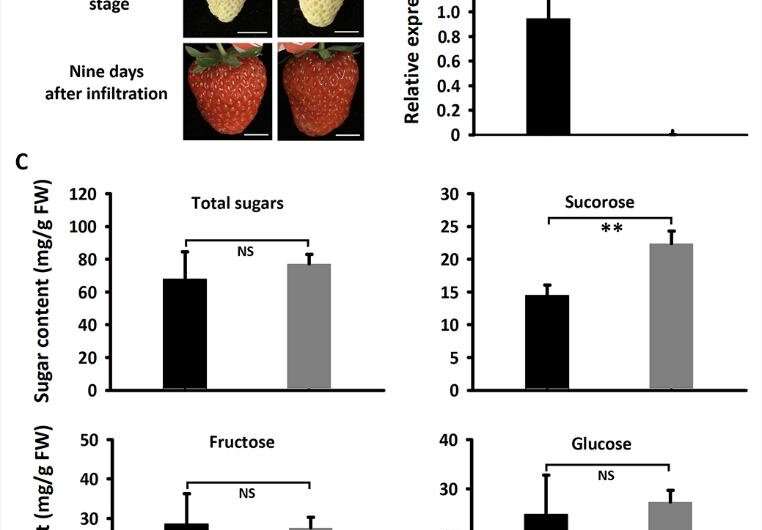Overexpression of MdSUT4.1 in strawberry fruit. Credit: PENG Qian
Apples are an economically important fruit crop worldwide. Sugar content is an essential component of fruit organoleptic quality, especially fruit sweetness, and thus is given a high priority in apple breeding programs. However, details on the complex molecular mechanism underlying fruit sugar accumulation remain scarce.
The molecular breeding of fruit crops group led by Prof. HAN Yuepeng from the Key Laboratory of Plant Germplasm Enhancement and Specialty Agriculture at the Wuhan Botanical Garden reported the role of the sucrose transporter (SUT) family in regulating fruit sugar accumulation in apple.
Gene-tagged markers were developed to conduct a candidate gene-based association study, and an SUT4 member MdSUT4.1 was found to be significantly associated with fruit sugar accumulation. MdSUT4.1 encoded a tonoplast localized protein, and its expression level was negatively correlated with fruit sugar content.
Overexpression of MdSUT4.1 in strawberry and apple callus had an overall negative impact on sugar accumulation, suggesting that it functioned to remobilize sugar out of the vacuole.
In addition, MdSUT4.1 is located on chromosomal region harboring a previously reported quantitative trait loci (QTL) for sugar content, suggesting that it is a candidate gene for fruit sugar accumulation in apple.
Results demonstrate the tonoplast-localized sucrose transporter MdSUT4.1 participates in regulating fruit sugar accumulation in apple.
This study is useful for better understanding of the impact of SUT4 proteins on fruit sugar accumulation. Moreover, the molecular marker of MdSUT4.1 may serve as a tool for genetic improvement of fruit sweetness in breeding programs of apple.
Results were published in BMC Plant Biology in a report titled "The sucrose transporter MdSUT4.1 participates in the regulation of fruit sugar accumulation in apple."
More information: Qian Peng et al. The sucrose transporter MdSUT4.1 participates in the regulation of fruit sugar accumulation in apple, BMC Plant Biology (2020). DOI: 10.1186/s12870-020-02406-3
Journal information: BMC Plant Biology
Provided by Chinese Academy of Sciences
























